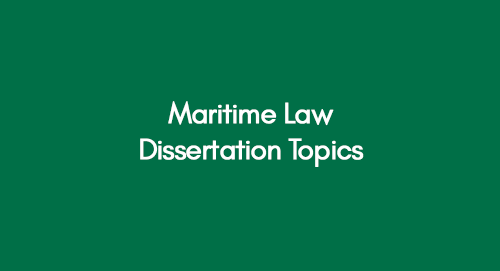
160 Interesting Biology Research Topics | Free Dissertation Ideas With Research Aims
April 19, 2023
120 Amazing Risk Management Dissertation Topics For Students
April 26, 2023Maritime law is a body of law that regulates activities regarding water bodies. It covers various aspects related to maritime activities, including shipping, navigation, marine pollution, fisheries, and offshore oil and gas exploration, among others. Topic selection for maritime law dissertations can be challenging for you. We offer dissertation writing help and provide a list of trending maritime law dissertation topics for your convenience.
Premier Dissertations has made a list of some trending dissertation topics in maritime law for 2025.
Employment Law Dissertation Topics | Commercial Law Dissertation Topics
Get 3+ Free Custom Topics within 24 hours;
List of Maritime Law Research Topics for 2025
To Trending Research Topics in Maritime Law
Prime Maritime Law Thesis Topics
Quality Maritime Law Research Topics For Undergraduate Students in 2025
Topic 16. Examining the Role of Maritime Law in Managing Oil Spill Liabilities: A Case Study of the UK Coastal Waters
Topic 17. Assessing the Effectiveness of International Maritime Safety Regulations in the UK Shipping Industry
Topic 18. Understanding the Impact of Brexit on the Enforcement of Maritime Dispute Resolutions in UK Ports
Topic 19. Evaluating the Role of UK Maritime Law in Combatting Human Trafficking through Sea Routes
Topic 20. Analysing the Legal Implications of Autonomous Ships on Maritime Liability: A UK Perspective
Topic 21. Examining the Role of Maritime Law in Protecting the Arctic Ecosystem: A Systematic Study of UK Policies
Topic 22. Assessing the Effectiveness of UK Port State Control in Enforcing International Labour Standards on Ships
Topic 23. Understanding the Impact of Maritime Piracy on International Trade: A Qualitative Study of UK Shipping Routes
Topic 24. Evaluating the Role of Maritime Law in Regulating the Use of Green Technologies in Shipping
Topic 25. Analysing the Legal Challenges of Salvage Operations in UK Territorial Waters
Topic 26. Examining the Role of UK Maritime Law in Addressing the Risks of Container Ship Fires
Topic 27. Assessing the Impact of UK Maritime Law on Fishing Rights in Shared Water Bodies
Topic 28. Understanding the Legal Framework for Managing Marine Insurance Claims in the UK
Topic 29. Evaluating the Effectiveness of Ballast Water Regulations in Protecting UK Marine Biodiversity
Topic 30. Analysing the Legal Implications of Brexit on Maritime Environmental Protection Policies in the UK
Topic 31. Examining the Role of Maritime Arbitration in Resolving Shipping Disputes: A UK Case Study
Topic 32. Assessing the Impact of UK Maritime Law on the Regulation of Underwater Cultural Heritage
Topic 33. Understanding the Role of Maritime Law in Preventing Shipboard Pollution in the English Channel
Topic 34. Evaluating the Effectiveness of UK Maritime Labour Laws in Protecting Seafarers' Rights
Topic 35. Analysing the Legal Framework for Combating Illegal Fishing in UK Waters
Topic 36. Examining the Role of Maritime Law in Addressing the Risks of Cybersecurity Threats to UK Ports
Topic 37. Assessing the Legal Implications of Climate Change on Maritime Boundary Disputes in the UK
Topic 38. Understanding the Impact of the International Maritime Organization’s Decarbonisation Goals on UK Shipping Laws
Topic 39. Evaluating the Role of UK Maritime Law in Regulating Shipbreaking Practices
Topic 40. Analysing the Legal Challenges of Managing Marine Protected Areas in UK Jurisdiction
Topic 41. Examining the Role of Maritime Law in Ensuring the Safety of Offshore Wind Farms in the UK
Topic 42. Assessing the Effectiveness of UK Maritime Law in Preventing Collisions in Heavily Trafficked Sea Lanes
Topic 43. Understanding the Legal Framework for Addressing Abandoned Vessels in UK Ports
Topic 44. Evaluating the Role of Maritime Law in Enhancing the Efficiency of UK Port Operations
Topic 45. Analysing the Legal Challenges of Regulating Floating LNG Facilities in UK Waters
Topic 46. Examining the Role of Maritime Law in Protecting Endangered Marine Species in UK Territorial Waters
Topic 47. Assessing the Impact of UK Maritime Law on the Development of Cruise Ship Regulations
Topic 48. Understanding the Role of UK Maritime Law in Managing Transboundary Marine Pollution
Topic 49. Evaluating the Legal Framework for Regulating the Transport of Hazardous Materials by Sea in the UK
Topic 50. Analysing the Impact of Technological Advancements on Maritime Liability in the UK
Interesting Maritime Law Dissertation Topics For Master Students in 2025
Topic 51. Analysing the Legal Implications of Autonomous Shipping on Maritime Liability: A UK Perspective
Topic 52. Evaluating the Role of UK Maritime Law in Protecting Marine Biodiversity in Exclusive Economic Zones
Topic 53. Understanding the Legal Challenges in Regulating Offshore Wind Farms Under UK Maritime Law
Topic 54. Examining the Impact of Brexit on UK Maritime Trade Agreements: A Case Study
Topic 55. Assessing the Effectiveness of UK Maritime Law in Addressing Climate Change-Induced Risks to Coastal Infrastructure
Topic 56. Evaluating the Role of International Maritime Law in Combatting Illegal, Unreported, and Unregulated (IUU) Fishing in UK Waters
Topic 57. Analysing the Legal Framework for Salvage Operations in UK Territorial Waters: A Systematic Study
Topic 58. Examining the Role of Maritime Law in Regulating Ballast Water Management in the UK
Topic 59. Assessing the Legal Framework for Managing Shipbreaking Activities in UK Ports
Topic 60. Understanding the Legal Implications of Cybersecurity Threats to UK Maritime Infrastructure
Topic 61. Evaluating the Role of Maritime Arbitration in Resolving Shipping Disputes: A UK Case Study
Topic 62. Analysing the Impact of Maritime Piracy on International Shipping Routes: A UK Legal Perspective
Topic 63. Examining the Effectiveness of the UK’s Port State Control Measures in Enforcing Maritime Safety Standards
Topic 64. Assessing the Role of Maritime Law in Regulating Carbon Emissions from Shipping in the UK
Topic 65. Understanding the Challenges in Regulating Underwater Cultural Heritage in UK Jurisdictional Waters
Topic 66. Evaluating the Effectiveness of UK Maritime Law in Combatting Modern Slavery on Merchant Vessels
Topic 67. Analysing the Legal Challenges of Managing Offshore LNG Terminals in the UK
Topic 68. Examining the Role of UK Maritime Law in Ensuring the Sustainability of Cruise Tourism
Topic 69. Assessing the Legal Implications of Ship Registration Policies on the UK Shipping Industry
Topic 70. Understanding the Role of Maritime Law in Managing Transboundary Marine Pollution in the English Channel
Topic 71. Evaluating the Legal Challenges in Implementing IMO Decarbonisation Targets in the UK
Topic 72. Analysing the Effectiveness of the UK’s Legal Framework in Addressing Marine Accidents Involving Tankers
Topic 73. Examining the Impact of Maritime Labour Law on Seafarers’ Welfare: A UK Perspective
Topic 74. Assessing the Role of UK Maritime Law in Regulating Deep-Sea Mining Activities
Topic 75. Understanding the Challenges in Enforcing Maritime Environmental Laws in UK Jurisdictional Waters
Topic 76. Evaluating the Effectiveness of UK Maritime Law in Managing Offshore Oil Spills
Topic 77. Analysing the Legal Framework for Addressing Maritime Terrorism in the UK
Topic 78. Examining the Role of Maritime Law in Regulating the Use of Green Shipping Technologies in the UK
Topic 79. Assessing the Legal Implications of Climate Change on UK Maritime Boundary Disputes
Topic 80. Understanding the Impact of Technological Advancements on Maritime Law in the UK
Topic 81. Evaluating the Role of UK Maritime Law in Protecting Small-Scale Fisheries
Topic 82. Analysing the Legal Challenges in Regulating Maritime Supply Chains: A UK Perspective
Topic 83. Examining the Effectiveness of UK Maritime Law in Addressing Marine Noise Pollution
Topic 84. Assessing the Role of Maritime Law in Facilitating International Collaboration on Marine Conservation: A UK Study
Topic 85. Understanding the Legal Framework for Managing Marine Insurance Fraud in the UK
Topic 86. Evaluating the Impact of Brexit on UK Maritime Safety Regulations
Topic 87. Analysing the Role of Maritime Law in Addressing Liability for Offshore Renewable Energy Accidents
Topic 88. Examining the Challenges of Enforcing International Maritime Conventions in UK Waters
Topic 89. Assessing the Legal Framework for Regulating Floating Ports in the UK
Topic 90. Understanding the Role of Maritime Law in Combatting Human Trafficking Through Sea Routes: A UK Study
Prime Dissertation Topics in Maritime Law For PhD Students
Topic 91. Evaluating the Legal Framework for Carbon Capture and Storage (CCS) in UK Offshore Areas: A Case Study
Topic 92. Analysing the Role of Maritime Law in Addressing Climate Change-Induced Sea Level Rise in the UK
Topic 93. Understanding the Challenges in Regulating Maritime Cybersecurity: A Systematic Study of UK Policies
Topic 94. Examining the Effectiveness of UK Port Regulations in Facilitating Sustainable Development
Topic 95. Assessing the Legal Implications of Artificial Intelligence Integration in UK Maritime Operations
Topic 96. Evaluating the Role of the UK in Shaping International Maritime Environmental Regulations
Topic 97. Analysing UK Maritime Law's Response to the Challenges of Polar Navigation
Topic 98. Understanding the Impact of Blockchain Technology on Shipping Contracts in the UK: A Qualitative Study
Topic 99. Examining the Legal Framework Governing the Decommissioning of Offshore Platforms in the UK
Topic 100. Assessing the Role of UK Maritime Law in Preventing Marine Biodiversity Loss in Protected Areas
Topic 101. Evaluating the Effectiveness of UK Legislation on the Liability of Shipowners for Oil Pollution
Topic 102. Analysing the Legal Implications of Underwater Drones for UK Maritime Security
Topic 103. Understanding the Challenges in Regulating Renewable Energy Installations in UK Territorial Waters
Topic 104. Examining the Legal Framework for Maritime Boundary Disputes in the UK Post-Brexit
Topic 105. Assessing the Role of UK Maritime Law in Regulating Transboundary Shipping Emissions
Topic 106. Evaluating the Impact of Green Port Initiatives on Maritime Trade in the UK
Topic 107. Analysing the Effectiveness of UK Laws in Managing Risks Associated with Offshore Hydrogen Production
Topic 108. Understanding the Legal Challenges of Implementing Autonomous Shipping Regulations in the UK
Topic 109. Examining the Role of UK Maritime Law in Protecting Vulnerable Coastal Communities from Marine Hazards
Topic 110. Assessing the Effectiveness of the UK’s Maritime Dispute Resolution Mechanisms: A Case Study
Topic 111. Evaluating the Impact of Maritime Law on Blue Economy Development in the UK
Topic 112. Analysing the Role of UK Maritime Law in Addressing the Environmental Impacts of Deep-Sea Mining
Topic 113. Understanding the Legal Framework for Regulating Floating Wind Turbines in UK Waters
Topic 114. Examining the Effectiveness of UK Maritime Law in Combatting Drug Trafficking via Sea Routes
Topic 115. Assessing the Legal Challenges in Enforcing Ship Recycling Standards in UK Shipyards
Topic 116. Evaluating the Role of UK Maritime Law in Regulating Offshore Carbon Trading Markets
Topic 117. Analysing the Impact of Digitalisation on Maritime Arbitration in the UK
Topic 118. Understanding the Legal Implications of Satellite-Based Monitoring for Maritime Security in the UK
Topic 119. Examining the Role of UK Maritime Law in Protecting Marine Ecosystems from Noise Pollution
Topic 120. Assessing the Effectiveness of UK Legal Instruments in Combatting Ship Abandonment Cases
Topic 121. Evaluating the Challenges in Harmonising UK Maritime Law with International Conventions Post-Brexit
Topic 122. Analysing the Role of UK Maritime Law in Mitigating the Risks of Underwater Explosions
Topic 123. Understanding the Legal Framework for Regulating Floating Storage and Regasification Units (FSRUs) in the UK
Topic 124. Examining the Impact of Maritime Law on Offshore Aquaculture Development in the UK
Topic 125. Assessing the Legal Challenges in Regulating Cross-Border Maritime Insurance Claims in the UK
Topic 126. Evaluating the Role of Maritime Law in Addressing Marine Plastic Pollution: A UK Study
Topic 127. Analysing the Effectiveness of UK Regulations in Promoting Sustainable Ship Design
Topic 128. Understanding the Legal Implications of Maritime Liability for Offshore Hydrogen Transportation in the UK
Topic 129. Examining the Role of Maritime Law in Regulating Underwater Tourism in UK Waters
Topic 130. Assessing the Impact of UK Maritime Law on the Development of Smart Ports: A Case Study
Connect With Writer Now
Discuss your requirements with our writers for research assignments, essays, and dissertations.
Importance of Selecting the Best Maritime Law Dissertation Topic
Review Our Full List of Latest Research Topics
For more maritime law research topics, please keep checking our website as we keep adding new topics to our existing list of titles.
GOOD LUCK!
Free Online Plagiarism Checker For Students
We will email you the report within 24 hours.
Upload your file for free plagiarism

Get an Immediate Response
Discuss your custom requirements with our writers




























